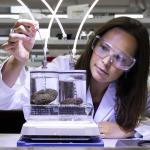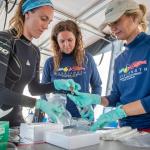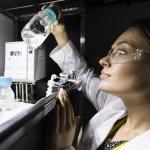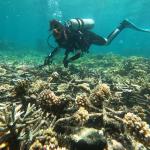The Future Reefs team conducts research and has depth of expertise across four key areas to improve the health of our reefs.

Coral metabolic biology
A central focus is to resolve the primary metabolic pathways and properties that regulate the effectiveness with which corals respond to “stress”. Genomic, metabolic and bio-optical “omics” platforms are developed to unlock pathways with which primary and secondary metabolites – both stable and volatile – operate as gate-keepers of coral health. This knowledge is used to inform novel diagnostic physiological indicators to specific stressors, and forms the foundation for metabolic flux models for new predictive models of coral fitness. Imaging approaches and micro-sensing have become critical platforms with which to visualise how this biology operates across different organization levels of corals, from specific cellular tissues to key “organelles”.

Coral biogeochemistry
Work focuses on understanding the interplay between biological, chemical, and physical processes of corals to better understand how current abiotic and biotic interactions will shape future reef conditions. This includes resolving the interplay between macro- and micro-nutrient cycling on reefs to establish the optimal biogeochemical niche for corals and whether nutrient adjustments can be an optimised tool for aiding coral stress tolerance. The group utilises environmental gradients as natural laboratories to study how corals survive at the periphery of their optimal ecological and biogeochemical niche. We work across elemental, molecular, cellular and organismal (physiological) scales considering biological response to both local environmental stress (e.g. pollution) and climate change. (Sub-program lead: Dr Emma Camp)

Coral microbial processes
Corals are profoundly influenced by the composition and function of their microbial communities that lives within and around their tissues. We examine the nature of the microbe-coral interactions, what drives them and consider the implications to long-term coral fitness. We employ a variety of molecular, microbiological and ecogenomic approaches, including metagenomics and metatranscriptomics, to examine the composition and functional capacity of the microbial assemblages associated with healthy, stressed and diseased corals. We pay particular focus to understanding the functional diversity amongst coral endosymbionts (Family: Symbiodiniaceae) of physiological, biochemical and molecular traits, and ultimately how this contributes to the susceptibility of host corals to stress. This focus is tied to unlocking the life history dynamics between in- and ex-hospite endosymbiont populations.

Coral reef management
An increasing focus is applying knowledge gained from our core research into coral reef management practices and policy. For example, identifying areas with high conservation value (e.g. reef systems thriving under natural extremes, source reefs) and developing improved targeted management frameworks. Our core research – understanding how the environment shapes the capacity of corals to grow and survive – has been key in guiding innovative active management strategies, including coral propagation or transplantation, where we implemented the first multi-species coral nurseries on the Great Barrier Reef, as part of solutions to maintain and “rebuild” coral biomass in partnership with Great Barrier Reef tour operators. The core research focus on coral metabolic properties is central to developing novel sensor-based based diagnostics of reef stress.

